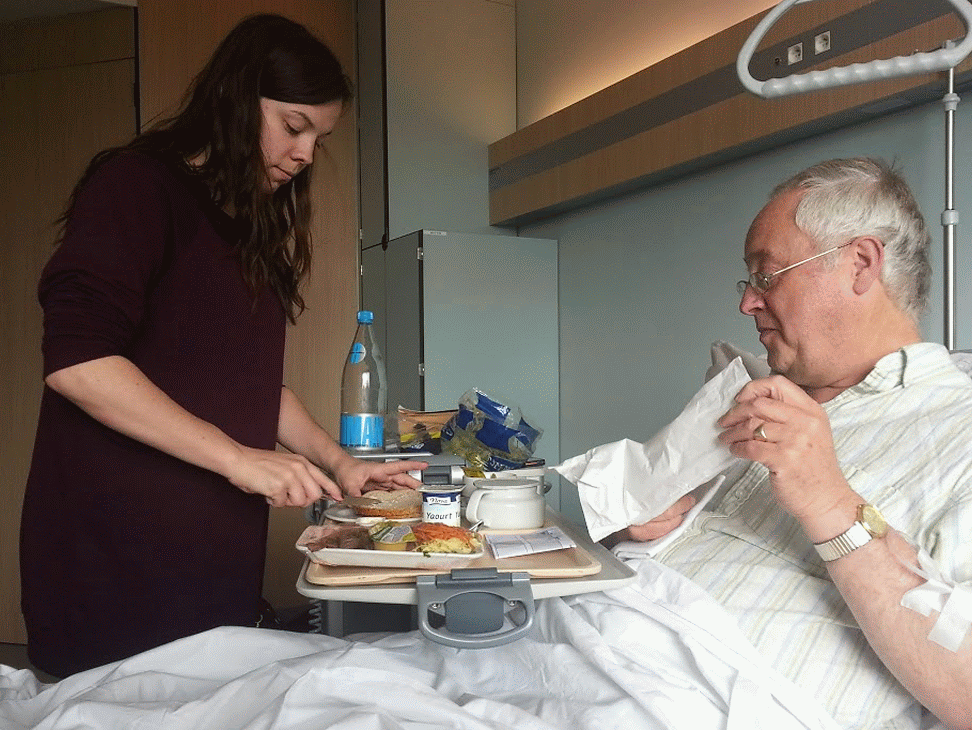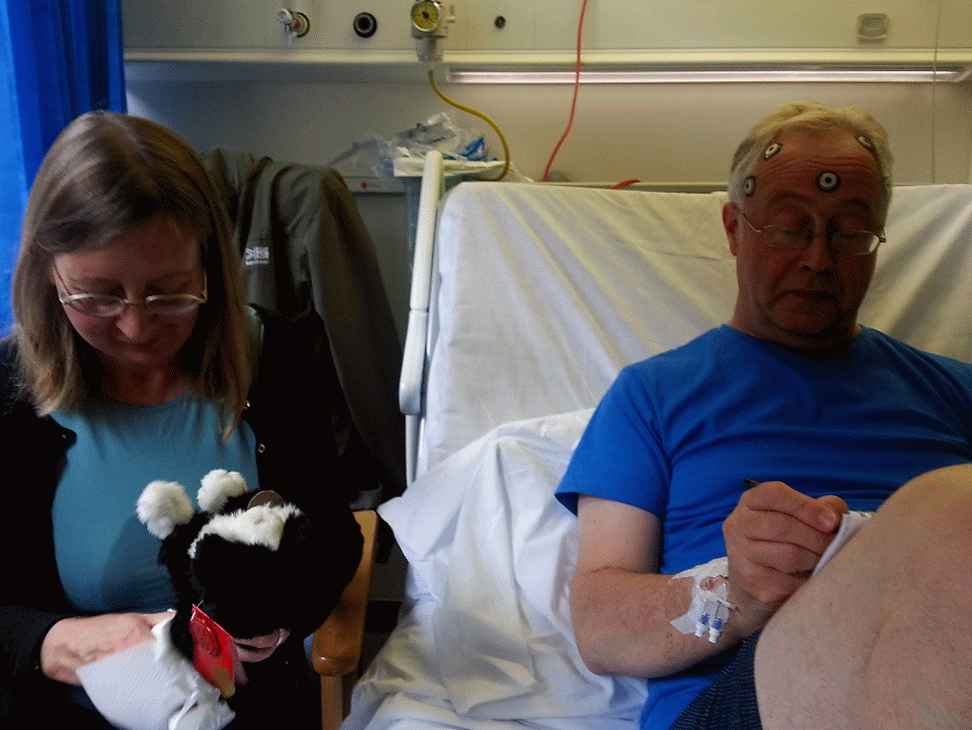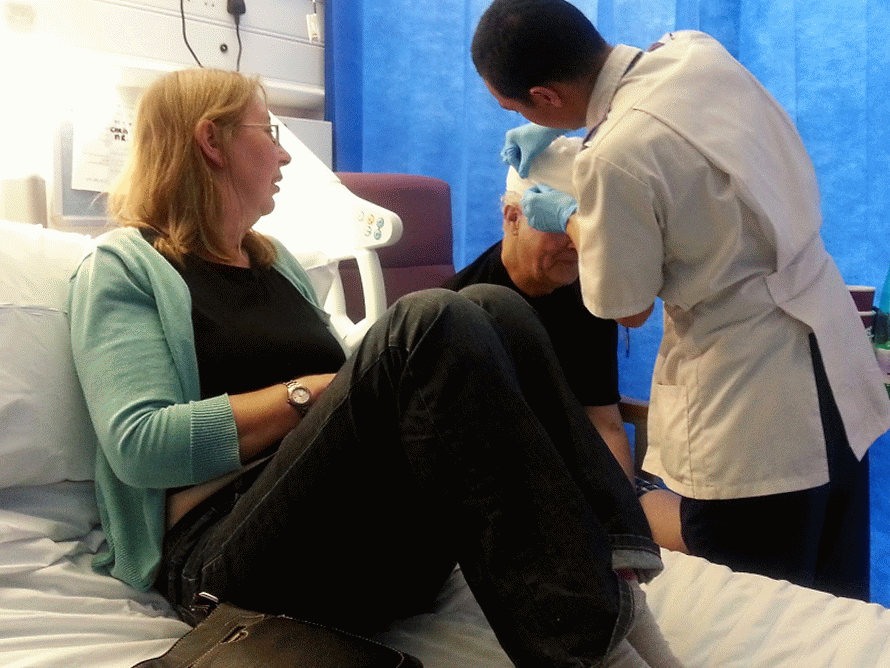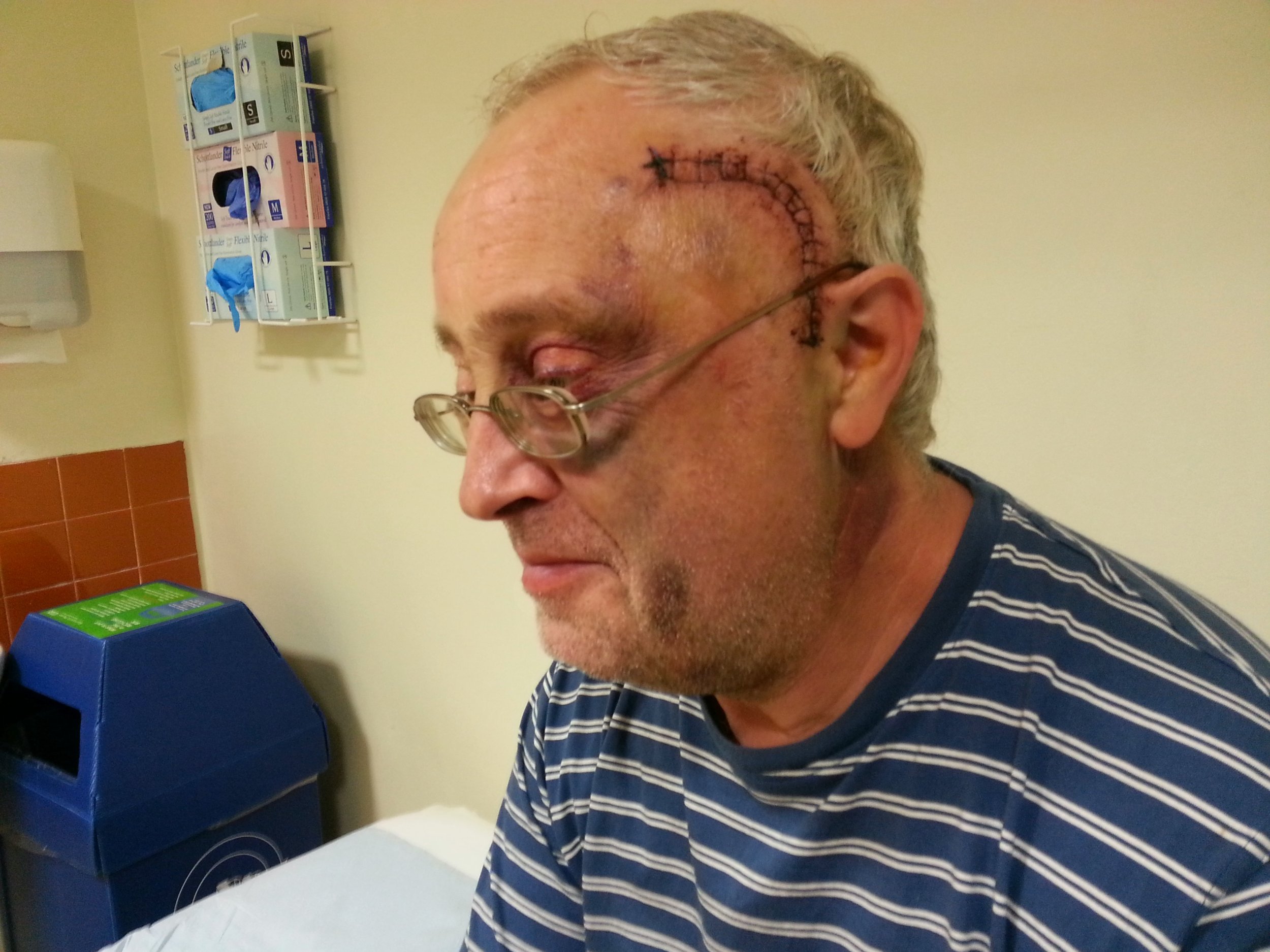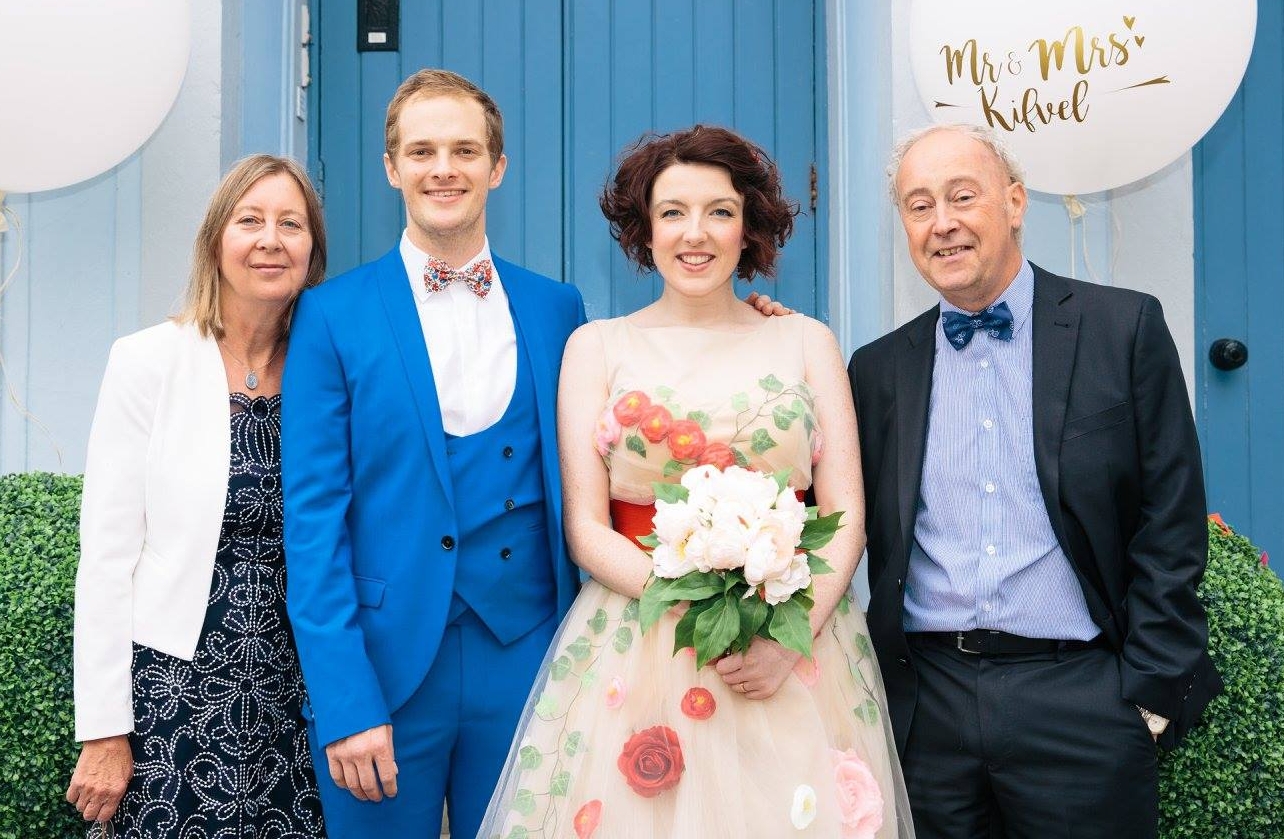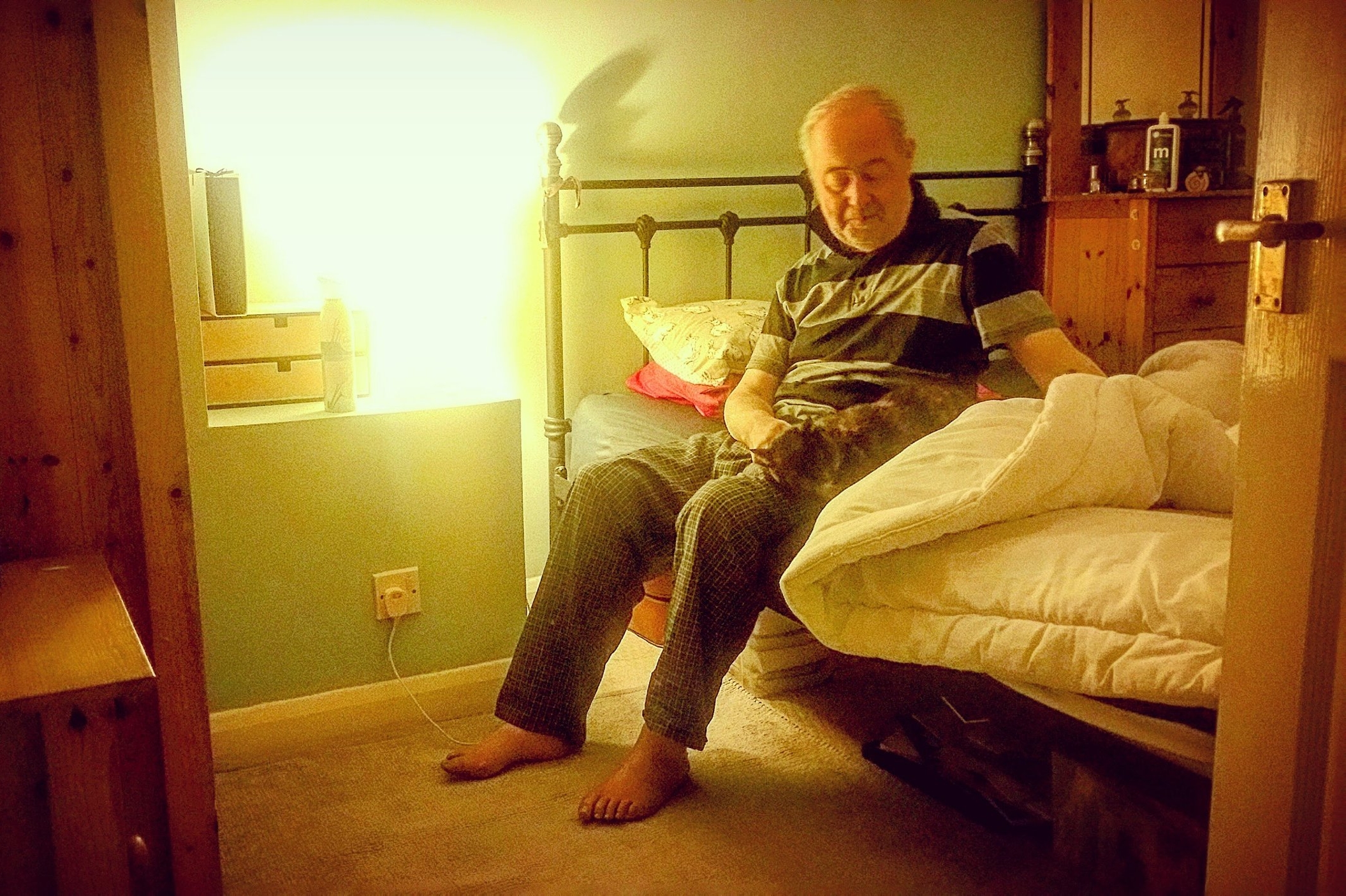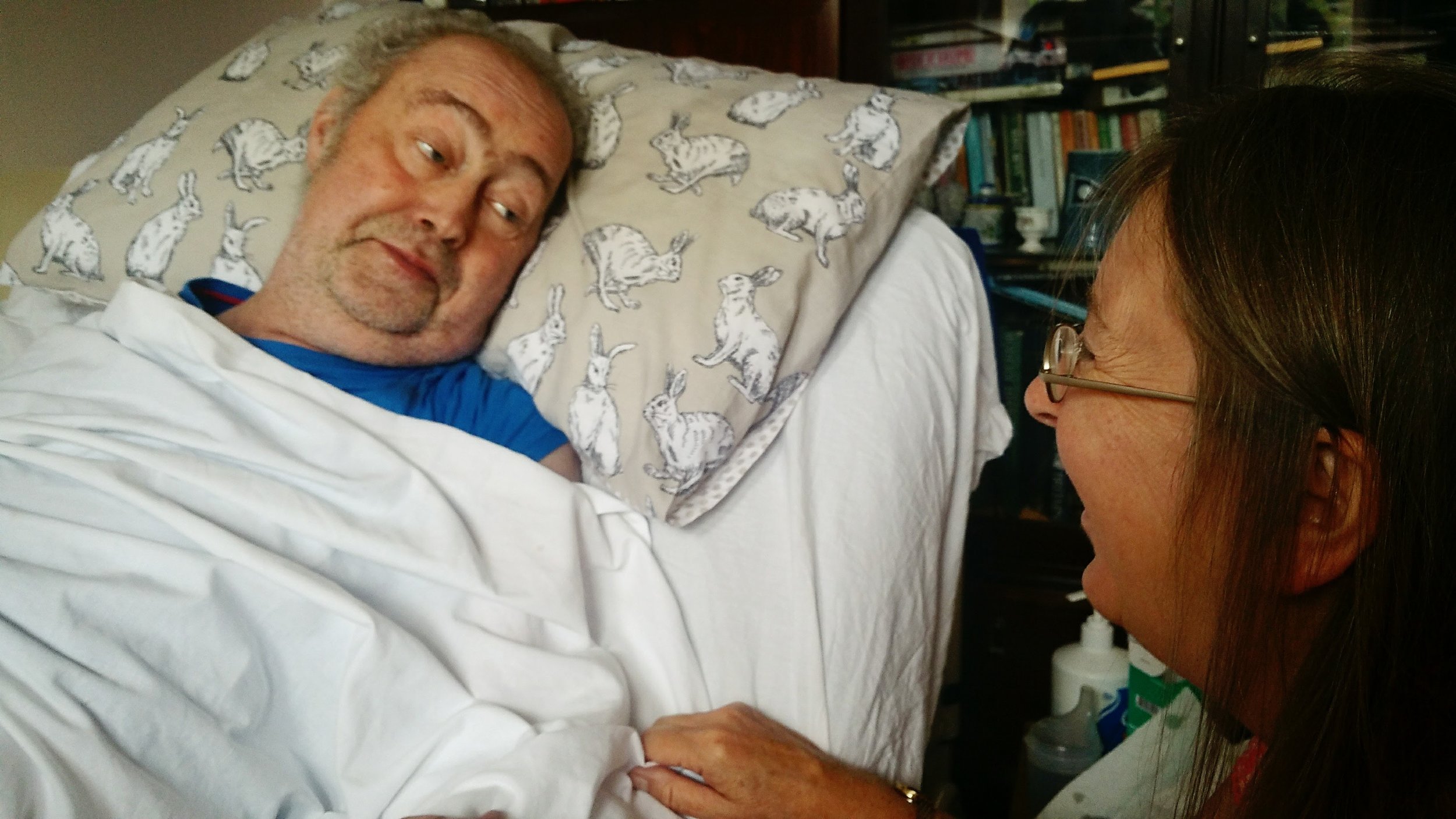INITIAL TREATMENT
Dad had surgery to cut the tumour out within a couple of weeks of his first seizure, by doctors at King’s College Hospital in London. But GBMs have threads of cells growing out of them, like long hairs or skinny tentacles, which stretch out from the tumour into the brain tissue around it. They prevent surgeons from removing the cancer entirely, so sooner or later, it grows back.
Before surgery, he knocked back the ‘pink drink’, which is a drug called 5-Aminolevulinic Acid. This causes tumour cells to glow a bright pink under UV light, making it easier for surgeons to tell the cancer apart from healthy brain tissue.
For the first 9 months, the only sign anything was wrong with Dad was the scar on his head. If he wore a hat, nothing would seem amiss. He was perfectly agile, his memory was sharp and he spoke eloquently.
He kept a blog about his early treatment and medicine which you can read here. Dad had 6 weeks of radiotherapy, and countless rounds of CEV and temozolomide chemotherapy at Guy’s Hospital Cancer Centre in London. He also had regular scans to monitor the size of the tumour.
He took Keppra to control his seizures, and for most of that first year, he hardly suffered from any. Like many brain tumour patients, he was prescribed dexamethasone (a steroid) to reduce the swelling around the tumour, and omeprazole to stop the steroid upsetting the stomach. He was also on domperidone, which is an anti-sickness drug.
He also took part in a clinical trial of a drug called DCVax, a personalised immunotherapy vaccine. The cancer cells removed during surgery are modified to increase the chance of the immune system attacking them (and any other similar cells), and are then injected back into the patient.
After the standard initial courses of chemo and radiotherapy, two out of three trial participants received the vaccine, and the rest received a placebo. The side effects from this treatment were pretty much non-existent, so we couldn’t tell whether he was taking the drug or not. The trial is ongoing, but early results seem positive.
STROKE
About 8 months after he was diagnosed, scans showed that the tumour had started to grow back and he had his second round of surgery in March 2015.
The day after he came out of theatre, he had a stroke. The swelling of his brain had constricted the veins and limited the blood flow.
Every hour after surgery, nurses ask patients to say their name, where they are and other basic questions. But during one of those checks, Dad couldn’t remember his birthday. He knew he needed the loo but didn’t know how to go. He started saying ‘Poochies are niiiiiice’, which was a massive red flag given that he was a diehard cat-lover. He could only talk in short or broken sentences, and his speech never fully recovered from that point.
He began to have absence seizures fairly regularly. Rather than causing him to fit on the floor, with absence ones he’d freeze to the spot and stare straight ahead. He’d become completely unaware of what was going on around him, and sometimes he’d lick his lips. The seizures usually lasted less than 30 seconds, but it’d take up to 2 hours for him to be fully aware again.
His memory got significantly worse over time, and his mobility declined too. He began to drag his left foot, and he shuffled rather than walked. In 2017 we started to use a wheelchair, which I think he was happy to use as it gave him the freedom to get out and about. It was tough for us to see that he needed it - another sign the cancer was winning.
final stages
In early 2017, scans at King’s showed that the tumour was growing fast. Surgery wasn’t an option, so we focused on trying to make the life he had left the best it could be.
One evening in June, Dad was standing but couldn’t lift his feet up to take a step. Mum physically had to move his legs for him while he leant on a zimmer frame. He wasn’t able to get upstairs to his bed, so he slept on the sofa that night.
He kept waking up to be sick - a symptom we’d been warned to look out for as a warning that the tumour was putting too much pressure on his brain. The next morning he wouldn’t wake up, so he was taken into hospital.
He was bed bound from that point onwards, and he began to sleep more and more.
He couldn’t speak, but he could still tap his feet along to his beloved Frankie Valli and Rolling Stones. (We managed to get Dad to this Frankie Valli gig back in 2015. At that point, Dad knew who I was but couldn’t remember my name, and yet managed to sing along to all the songs. The human mind is a funny old thing.)
We were really lucky that we were able to bring him home for the last 6 weeks of his life. He was in a bed looking out into the garden so he could watch the birds, and had carers visiting several times a day.
Fortunately he recognised people right up to the end, and up until about a week before he passed, he could still squeeze my hand and kiss my cheek. By that point, he slept almost all the time, and was only awake for fleeting moments. He found it harder to swallow for the last week, almost impossible at times, which made getting drugs down his throat incredibly hard.
Taken in his last few days
One day his breathing sped up, and became much louder. It was very raspy because of the mucus which had built up in his airways, and his chest vigorously moved in and out with every breath. I didn’t realise then, but that noise was the death rattle. I wish we’d been told what it was at the time. It seems obvious looking back, but I’d never really thought about what the death rattle would be like.
I found it distressing to listen to and burst into tears when I first heard it, but later this video of a palliative care doctor hugely reassured me about it. The rasping was difficult to listen to, but she says it's a sign that a patient is so relaxed that they don't think to clear their throat. This breathing went on for about 20 hours before it began to slow. (I’ve subsequently read that it usually lasts for 23 hours on average, but at the time I mistakenly thought it could go on for days.)
Over the last hour of Dad's life, his breathing became erratic. He’d exhale and then not breathe in again for what felt like an eternity. I don’t think I’ve ever been more scared. We'd been without any medical support for hours, but thankfully a doctor arrived a few minutes before he passed. If angels exist and walk the earth, that woman was one for sure.
The moment he died was really tender and gentle, and was much lovelier than I feared it might be. Hearing is the last sense to go, so we told him we loved him, and sang him a daft song he used to croon to us as babies when he was changing our nappies. “Christopher-a-roonikins, he's my ickle boofle one. Daddio-a-roonikins, he's my ickle boofle one.” We smoothed his hair and stroked his arms and held his hands. We kissed him goodbye and told him we loved him again, and he slipped away.
The Kiff family in September 2014
The Brain Tumour Charity is the UK's leading charity for work in this area, and investment into research is the only real hope of defeating brain tumours. You can donate online here. Or to donate £5, you can text HOPE to 70123. (Costs £5 plus one message at your standard network rate. If you don’t want the charity to contact you in future, also text NOMORE to 70123).

